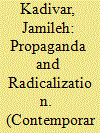|
|
|
Sort Order |
|
|
|
Items / Page
|
|
|
|
|
|
|
| Srl | Item |
| 1 |
ID:
184341


|
|
|
|
|
| Summary/Abstract |
This article examines Jordanian postage stamp depiction of the West Bank as part of the Hashemite Kingdom from 1952 to 1985. The majority of maps of the West Bank are featured as part of Jordan, both during Jordanian rule of the West Bank (1948–1967) and after Israel conquered the land during the 1967 war. Sometimes the West Bank is delineated from Jordan to suggest a territorial dispute with Israel, while other times, the West Bank is shown as part of Palestine. The ambiguous representations of the West Bank as Jordanian territory, disputed territory, and Palestinian territory reinforce Hashemite sovereignty claims to the West Bank while also supporting Palestinian rights and acknowledging Jordanian rule of the West Bank was conditional upon settlement of the Palestinian issue. Finally, this analysis seeks to explain why stamps stopped showing the West Bank as part of Jordan in 1985, three years before the kingdom formally severed all legal and administrative ties to the land.
|
|
|
|
|
|
|
|
|
|
|
|
|
|
|
|
| 2 |
ID:
184342


|
|
|
|
|
| Summary/Abstract |
The process of becoming radicalized and joining extremist groups like Daesh, in countries with a Shi’a majority, such as Iran, is a controversial topic that has not received sufficient attention in the literature. This study examines Daesh’s media content in Farsi and seeks to provide an analysis of Daesh’s main messages, which have the primary objective of profoundly impacting their target audiences in Iran. This study collected data from 16 Iranian members of Daesh to discover how they were radicalized and why they decided to join Daesh. This study seeks to understand whether the media and Daesh’s propaganda are indeed the key reasons behind the radicalization of Daesh’s Iranian members and the creation of others’ perception of their mindsets against Iran and its Shi’a population, and to discover other possible factors that play a role in the radicalization process. While Daesh media and messages hold salience in relation to the Daeshization of some, studying such complex socio-political issues is rooted in an amalgamation of different personal, social, political, economic, and cultural push and pull factors. Such phenomena cannot, therefore, be reduced to only one of the mentioned elements.
|
|
|
|
|
|
|
|
|
|
|
|
|
|
|
|
| 3 |
ID:
184340


|
|
|
|
|
| Summary/Abstract |
Although the IMF and the World Bank have advocated public sector reforms for market-oriented economic development, Egyptian authoritarian leaders have avoided such reforms. Egypt maintains a large public sector with a significant number of young Egyptians among its ranks. However, the public sector has shortcomings such as overstaffed government departments, deteriorating working conditions, and employee protests. This study uses the “social contract” concept to understand why Egypt’s political leaders have preserved this inefficient institution. The logic of the “social contract” works under two conditions: generous welfare as the main source of the regime’s legitimacy and a lack of accurate information concerning the extent to which people can tolerate painful reforms under authoritarian rule. Contrary to the conventional understanding, a lack of democratic institutions imposes “shackles” upon authoritarian leaders rather than giving them wide discretion regarding policymaking and the manipulation of institutions for their survival. The findings thus offer important insights into the dynamics of authoritarianism.
|
|
|
|
|
|
|
|
|
|
|
|
|
|
|
|
| 4 |
ID:
184339


|
|
|
|
|
| Summary/Abstract |
The Egyptian–Israeli peace treaty marked a new era in the history of the Arab–Israeli conflict. Relying methodologically on the history of ideas and diplomatic history, this article sheds light on the diversity of the perceptions and receptions of peace and relations with Israel as manifested by two influential Egyptian public opinion shapers who represented polar approaches—the mouthpiece of the Muslim Brothers—the journal Al-Da‘wa and Rūz al-Yūsuf, the semi-independent liberal weekly with a moderate left bias. The timeframe is 1977–1982—from Sadat’s historical visit to Jerusalem to the Israeli invasion of Lebanon and its impact on the budding Israeli–Egyptian relations.
|
|
|
|
|
|
|
|
|
|
|
|
|
|
|
|
| 5 |
ID:
184343


|
|
|
|
|
| Summary/Abstract |
The Gulf Cooperation Council (GCC) is considered one of the most important regional organizations in the Middle East and North African (MENA) region, which effectively solves some of the crises in the sub-region and the wider Middle East. GCC has employed many diplomatic procedures to address regional crises, including mediation, negotiation, and arbitration. Undoubtedly, GCC has successfully resolved some intrastate conflicts, particularly border conflicts among its member states. However, despite these achievements, the GCC has failed to resolve several regional disputes, and the continuation of such crises threatens the region’s security and stability. This article seeks to explore why the GCC institutions are ineffective in resolving some regional crises. In doing so, it addresses the comparative study by focusing on two case studies (the Iraq–Iran War and the ongoing Yemen Crisis) and provides three main results: first, the GCC has not directly intervened as an institution to resolve certain disputes; however, some GCC members have acted on its behalf and represented it. Second, despite the GCC member states’ efforts, they are still unable to resolve and settle some disputes because they prioritize self-interest over collaboration. Third, the conflict of interest of various regional actors contributes to the lack of significant progress in resolving crises.
|
|
|
|
|
|
|
|
|
|
|
|
|
|
|
|
|
|
|
|
|